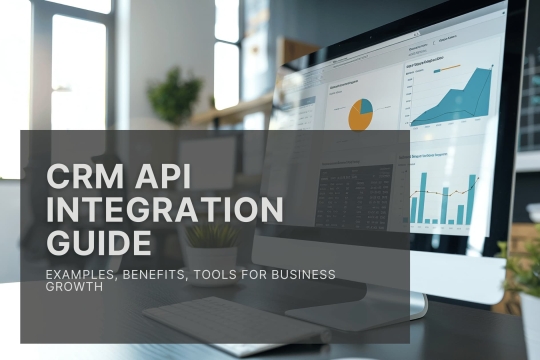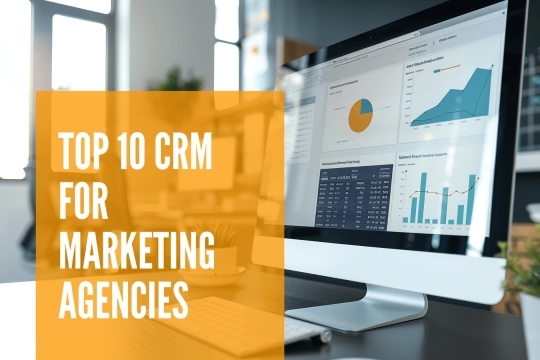When to Hire CRM Database Cleanup Consultants for Your Business

When CRM data quality declines, sales and marketing teams struggle. Campaigns underperform, reports become unreliable, and customer engagement suffers. While many companies attempt to manage these issues internally, there comes a point where outside help is the more effective choice.
That’s where CRM database cleanup consultants come in. These specialists restore data accuracy, strengthen reporting, and ensure the CRM remains a trusted tool for growth. In this article, we’ll cover the signs it’s time to hire a consultant, what they do, and how to choose the right partner.
Why CRM Data Quality Matters
Your CRM system is only as useful as the information inside it. CRM data refers to the collection of customer details, such as contact records, job titles, phone numbers, and past interactions. When this information is accurate and up-to-date, it becomes the backbone of effective sales, marketing, and customer relationship management.
Here’s why strong CRM data quality is so important:
- Reliable customer engagement: Accurate data ensures your sales and marketing teams reach the right people with the right message. Outdated or incorrect information leads to missed opportunities.
- Better business intelligence: Clean data allows leaders to make informed decisions about strategy, campaigns, and growth. Poor data quality skews reporting and creates misleading insights.
- Efficient sales and marketing efforts: A clean CRM database helps sales and marketing teams stay on the same page, avoid duplicate outreach, and reduce wasted time on incorrect leads.
- Improved customer journey tracking: Up-to-date contact records provide a clear view of how existing customers and prospects move through the sales cycle, enabling more personalized communication.
- Stronger customer relationships: Accurate data allows businesses to tailor service and support, showing customers that their needs and history are understood.
When CRM data is clean, businesses can trust the CRM software as a reliable tool. When it’s messy, everything from marketing campaigns to customer service suffers.
Common CRM Data Quality Issues
Even the best CRM platforms can become filled with problems if data is not managed carefully. Data quality issues often creep in gradually, and over time, they weaken the entire customer database. Recognizing these issues is the first step toward addressing them.
Duplicate Data and Records
Duplicate records happen when the same customer information is entered more than once, often due to inconsistent data entry or importing lists from multiple data providers. This wastes sales and marketing efforts by creating confusion about which record is correct.
Outdated or Obsolete Data
Customer details, such as phone numbers, job titles, or company information, change frequently. If updates aren’t made, the CRM becomes filled with obsolete data, leading to communication breakdowns and poor customer engagement.
Incomplete or Missing Information
A CRM database is only useful when contact records are complete. Missing email addresses, job titles, or other key details make it difficult for sales and marketing teams to track the customer journey and personalize communication.
Dirty Data and Inconsistent Formats
Dirty data refers to information entered incorrectly or stored inconsistently. For example, some phone numbers might include country codes while others don’t, or job titles may be written in multiple ways. Without standardized data formats, reporting becomes unreliable.
Data Integrity Risks
When poor data hygiene spreads across the CRM, it reduces trust in the system itself. When sales and marketing teams know the data is unreliable, they’re less likely to use the system, which hurts both customer relationships and business decisions.
Signs You Should Hire CRM Database Cleanup Consultants

Most businesses try to manage CRM data cleanup, but there comes a point where internal resources aren’t enough. If any of the situations below sound familiar, it may be time to bring in CRM database cleanup consultants.
1. Overwhelmed Internal Teams
When sales or marketing teams spend more time fixing CRM records than actually using them, it’s a clear sign that data problems are out of control. Employees may be manually correcting contact data, removing duplicates, or trying to piece together missing details instead of focusing on customer engagement.
Consultants help relieve this burden by taking ownership of data cleanup. Their specialized tools and processes allow them to work more efficiently than internal resources, freeing your team to focus on revenue-generating activities.
2. Sales and Marketing Teams Are Not Aligned
Disorganized CRM data often causes misalignment between sales and marketing. For example, the marketing team may be running campaigns based on outdated job titles or email addresses, while the sales team is chasing leads that have already been disqualified. This creates frustration and wasted effort.
Bringing in consultants ensures both teams are working from a single, clean database. With duplicate records removed and contact information corrected, sales and marketing efforts become more coordinated and effective.
3. Persistent Dirty Data
Sometimes, despite repeated cleanup attempts, the same problems keep coming back, including duplicate data, missing information, or bad formatting. This usually happens because internal processes don’t address the root causes of poor data quality.
Consultants provide structure and expertise to solve these deeper issues. They not only clean existing records but also implement rules and safeguards to prevent the same errors from happening again.
4. Business Growth or Expansion
During rapid growth, mergers, or when migrating to a new CRM platform, customer databases often become overloaded with errors. Data from different sources may not match, creating duplicate records and inconsistent formats. These issues can slow down sales efforts at a critical time.
Consultants help businesses navigate these transitions by consolidating records, standardizing data formats, and ensuring clean and accurate data supports the next stage of growth.
5. Unreliable Business Intelligence
When dashboards and reports don’t reflect real business activity, poor CRM data is often the cause. Inaccurate data prevents leaders from making informed sales and marketing decisions.
Consultants restore confidence in CRM reports by cleaning the data that powers them. With accurate and reliable insights, leadership teams can make smarter, data-driven decisions.
- New to CRMs and don’t know where to start?
- Stuck with a broken setup that someone else botched?
- Tried the DIY route but know it’s not working the way it should?
At PointsPeak, we help businesses:
- Choose the right CRM for their needs
- Clean up and rebuild messy, underperforming setups
- Fix automation issues that cost you leads and sales
- Build scalable, conversion-focused systems that grow with you
What CRM Database Cleanup Consultants Do
CRM database cleanup consultants specialize in restoring and maintaining the accuracy of customer data within a CRM platform. Their role is to ensure that sales and marketing teams can rely on the database as a trusted source of information. The services they provide often include:
- CRM Data Cleansing Services
Consultants remove duplicate records, scrub outdated information, and correct data errors. This process transforms a cluttered database into a reliable foundation for customer relationship management. - Standardizing Data Formats
Inconsistent data formats lead to confusion and unreliable reports. Consultants ensure that details like phone numbers, job titles, and company names follow a consistent structure, improving both reporting accuracy and communication. - Implementing Validation Rules
Validation rules are built-in checks within the CRM software to prevent bad data entry at the source. For example, the system might require a valid email format before allowing a record to be saved. Consultants help businesses set up these rules to prevent future errors. - Master Record Management
When multiple versions of the same customer exist, consultants create a master record that consolidates the most accurate information. This single source of truth strengthens customer profiles and avoids duplication in sales and marketing outreach. - Ongoing Support and Monitoring
Data cleanup is not a one-time event. Many consulting firms offer ongoing support, including regular audits and data hygiene checks, to ensure customer databases remain accurate as the business grows.
By providing these services, consultants not only fix current data issues but also build processes that maintain data integrity over time.
Benefits of Hiring Consultants

Hiring CRM database cleanup consultants provides more than just a one-time fix for bad data. Their expertise creates lasting improvements that directly support sales, marketing, and customer engagement. Key benefits include:
- Improved Sales and Marketing Alignment
A clean CRM database ensures that sales and marketing teams are working from the same customer profiles. This alignment reduces duplicate outreach, shortens the sales cycle, and improves the impact of marketing campaigns. - More Informed Decisions
Reliable CRM records strengthen business intelligence. Leaders can confidently use reports and analytics to guide strategy, knowing the data behind them is accurate. - Higher Customer Engagement
Clean and accurate data make it easier to personalize communication. Customers receive relevant messages based on up-to-date information, which improves satisfaction and strengthens relationships. - Resource Efficiency
With consultants handling data management, internal resources can focus on core business priorities such as sales efforts and customer relationships. This prevents staff from being bogged down by time-consuming cleanup tasks. - Scalability and Ongoing Support
Many consulting firms act as strategic partners, offering ongoing support and monitoring. This ensures the CRM database stays accurate as the business grows and adapts to new sales and marketing needs.
The result is a CRM system that becomes a reliable tool for growth, rather than a source of constant frustration.
If you’re thinking, “There’s probably a better way to do this…” — you’re probably right.
How to Choose the Right CRM Data Cleaning Services Partner
Not all consulting firms offer the same level of expertise or support. Choosing the right partner is vital for long-term value from CRM data cleanup. Here are the most important factors to consider:
- Industry Experience
Look for a consulting firm with proven experience in your industry or with your CRM software, such as HubSpot CRM or Salesforce. Industry-specific knowledge helps them anticipate common data quality issues. - Approach to Data Cleansing
Ask whether the firm uses automated tools, manual processes, or a combination of both. The best partners balance automation for efficiency and human oversight for accuracy. - Data Security and Integrity
Since consultants will be handling sensitive customer data, confirm they follow strict security practices. They should have policies in place to protect data integrity and confidentiality. - Integration with Third-Party Data Providers
Many businesses supplement their CRM records with external data. Choose a partner who can work with these sources effectively, ensuring consistency and reducing duplicate records. - Ongoing Support Options
One-time cleanups solve the current problems but don’t prevent new issues from arising. A reliable consulting partner provides ongoing support through regular data audits and validation rules, helping maintain long-term data accuracy. - Transparency and Communication
Reliable consultants clearly explain their process, provide regular updates, and set realistic expectations. Be cautious of firms that promise instant results without outlining how they will achieve them.
The right partner doesn’t just clean your database—they help build a foundation for data hygiene and customer relationship management that lasts.
Conclusion
A CRM database is one of the most valuable tools a business can have, but only if the data inside it is accurate and reliable. Poor CRM data quality leads to wasted marketing efforts, misaligned sales strategies, and missed opportunities to strengthen customer relationships.
Hiring CRM database cleanup consultants is a strategic way to solve quality issues. They don’t just fix duplicate records, outdated information, or missing details—they build lasting processes that keep data clean, support informed decisions, and align sales and marketing teams.
If your business is struggling with dirty data or unreliable reports, now is the time to consider outside expertise. At PointsPeak Marketing, we help turn messy CRM databases into powerful tools for growth and customer engagement. With clean data and the right systems in place, your CRM can become a true driver of smarter sales and marketing.
Contact PointsPeak to learn more about CRM database cleanup consultations and how to improve your CRM's efficiency.


